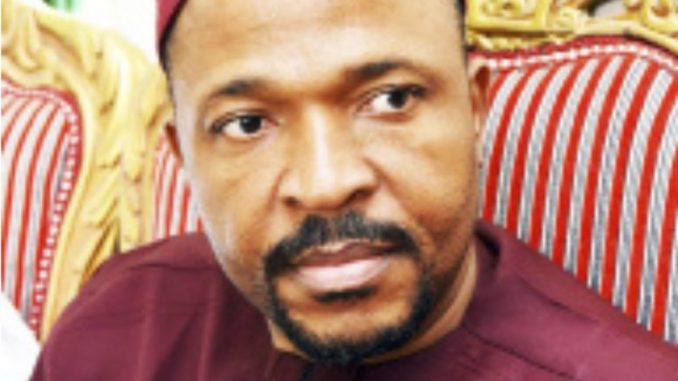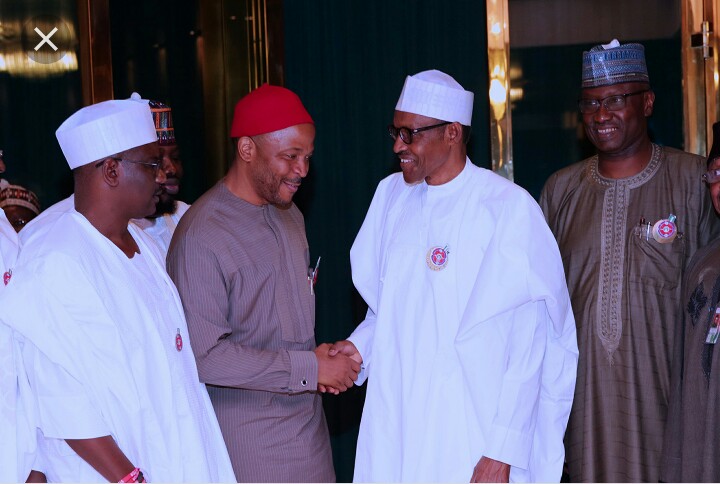
—- What is sauce for the goose is sauce for the gander.
Justice Osuji.According to our great sage Chinua Achebe of blessed memory, “until the lions have their own historians, the history of the hunt will always glorify the hunter”.
As the life span of the President Mohammadu Buhari’s administration gradually comes to a glorious end with the imminent change of guard, alignments and realignments have started with many already jostling for the highly exalted position. Among the things that characterizes this era are political correctness and political statements. One of those statements thrown loosely is “Power is taken and not given”
The phrase “nobody gives you power; you have to grab it” credited to Gloria Steinem has unwittingly gained the aura of truth while in the face of Nigerian democratic reality it falls flat on its face.
This phrase is used by pundits and politicians to underscore there perceived knowledge of politics. Recently, a Political chieftain, Alhaji Tanko Yakasai was quoted as saying “Igbos should not expect power to be served on them, they should build bridges if they want a president of Southeast extraction.” According to him “power is taken and not given.” This is one among many. While hoping to find time in some other fora to discuss how the Igbos are the highest bridge builders “ from Alaba Lagos to Sabon Gari Kano” I shall labor here to put the records straight by showing that indeed power is given in a democratic setting like ours.

Though space may not permit us but a little voyage through the history lane exposes the statement that “power is not given but can only be grabbed” to be shallow, hollow, spurious and lacking in the slightest dint and scintilla of truth when confronted with history laced with facts.
The fact is power can either be given or taken by force as in the military Coup d’état. This is the norm in Nigeria and other parts of the world.
An apt and instructive illustration that power is given was evidenced in 1998 when Nigeria began her transition to democracy and civil rule. The politician who was then most prominent in the political terrain was Dr Alex Ekwueme. His position as a former vice president in addition to his position as the leader of the G34 that opposed the draconian rule of General Sani Abacha favored his course. Ekwueme was also well educated and filled with ideas, calmness of spirit, and the requisite leadership qualities.
However, there was a general feeling on the need to placate the South-West for the presumed injustice meted at Chief MKO Abiola, who was denied his presumed presidential victory in 1993 by General Ibrahim Babangida, which was sustained by Abacha. Abacha had arrested and detained Abiola in 1994 for declaring himself the winner of the 1993 election and therefore the president of Nigeria. Abiola died mysteriously in detention in 1998 after the death of Abacha, at a time there were hopes that he would soon be released and possibly given back his mandate.
The military hierarchy, especially serving and retired generals of Northern extraction, narrowed the choice of president down to Chief Olusegun Obasanjo. They saw him as the only person from the South-West that they could trust to lead Nigeria, because of their belief that he would not work against their interest and the interest of the North. They had worked with him between 1976 and 1979 when he was the military head of state.
Obasanjo had no ambition to be president. He was mostly grateful to have been released from prison and to be alive. He was given a state pardon with other political prisoners. When the issue of being the president was raised, he asked how many presidents those behind it wanted to make out of him, having led Nigeria before.
However, those who were bent on having him as the president did not relent. They registered him in the Peoples Democratic Party, bought the presidential form of the party and bankrolled his campaign. Obasanjo defeated Ekwueme by a wide margin to become PDP’s presidential candidate at the party’s primary in Jos, Plateau State.
In the All People’s Party (which later became All Nigeria People’s Party), Dr Ogbonnaya Onu from the South-East emerged the presidential candidate. There was a third party, the Alliance for Democracy. It was formed by some South-West members of the PDP, who pulled out in protest and joined the APP, and eventually pulled out of the APP.
To ensure that the election was an all South-West affair, Onu resigned as the candidate of the APP for Falae to take his position. Obasanjo eventually won the election and was declared the president-elect.
Right from when Obasanjo was approached to contest the election, one could see that his emergence as the president in 1999 was a fait accompli. General Theophilus Danjuma said that much when he threatened to go on exile if Obasanjo did not become the president in 1999. Therefore, power was handed over to Obasanjo on a silver platter. He did not grab it.
Again, in 2006, After Obasanjo’s third-term ambition was dashed in by the Senate led by Senator Ken Nnamani, Obasanjo single-handed chose Alhaji Umaru Yar’Adua and Dr Goodluck Jonathan as the candidate and running-mate respectively over Atiku Abubakar, Dr Peter Odili, Mr Donald Duke and others who put in more efforts to win the primaries. Yar’Adua never showed any interest in the presidency. Obasanjo picked him and made him the president of Nigeria.
In 2010, Yar’Adua died in office and Jonathan succeeded him. Politically, Jonathan was virtually an obscure figure until the impeachment of his principal, Chief Diepreye Alamieyeseigha, in December 2005. Jonathan became the governor of Bayelsa State. While he was savouring that, Obasanjo made him the running-mate to Yar’Adua, and he subsequently emerged the vice president of Nigeria on May 29, 2007 without lifting a finger. On May 5, 2010, Yar’Adua died in office and Jonathan became the president of Nigeria without grabbing any power. It simply fell into his lap with the help of Obasanjo who had made him Yar’Adua’s running-mate, even when there were more influential and battle-ready candidates from the South-South.
Premised on the above backdrop, one could clearly glean that in a democratic setting power is served a la carte unlike in military regime where power is taken by force. Power is given especially in Nigeria for many reasons and considerations, especially For National cohesion and unity. While in the case of Obasanjo power was handed to him in a bid to appease the Southwest for the perceived injustice meted at MKO Abiola, In the case of Jonathan it was given to solve the problem of minority; to give the minority a sense of belonging and also to quell the rising surge of militancy in the region.
Without contention, the Southeast (Igbos) is an integral component of Nigeria, the Igbo ethnic group is one of the Tripod on which Nigeria stands. While the other two regions have had a fair share of the pinnacle of power, the Igbos have never tasted such, not even the position of a Vice President since the advent of our nascent democracy. If power could be given to the Southwest to placate the presumed injustice meted at one Man, MKO Abiola, it becomes equitable, fair and just to mollify the SouthEast for the death of over 3000 of its compatriot and the hardship they suffered during the civil war. Allowing the Igbos produce the Next president of Nigeria will in no small measure mitigate and heal the wounds of the 6 Jul 1967 – 15 Jan 1970 civil war and indeed give them a deserved sense of belonging. This will foster national cohesion and serve as a veritable tool of reintegration. More so, factoring the SouthEast in the political equation of Nigeria will go a long way to douse the vociferous outcry of marginalization by the region and without doubt, quell the clamor for cessation just as the election of President Goodluck Jonathan gave a descent burial to the militancy agitation.
Now, we have been able to established that power is given in a democratic setting based on prevailing circumstances, especially on the need to give all components of the nation their deserved sense of belonging. It is also apposite at this point to say clearly that though power is given; it’s not given away.
Are we asking President Mohammadu Buhari to give away power? NO! Power is recycled for continuity and consolidation.
We are only urging president Buhari to look within his circle and find a man of the SouthEast extraction who has by past services and tenacity proved his loyalty to be unflinching. One who has earned his trust. President Buhari must give power to a man who sincerely believe in his agendas. One who will leverage on his achievements and consolidate on his giant strides without more.
President Muhammadu Buhari should look the way of Honorable Chukwuemeka Nwajiuba, HCN, the serving minister of state for education whose Midas touch transformed TEtfund into goldmine. A man who stuck to his guns even when President Buhari’s presidential ambition appeared hazy.
Nwajiuba’s loyalty, commitment and tenacious belief in President Buhari’s ambition cannot be overemphasized. The young, vibrant and pragmatic Minister of state for Education has proved that indeed loyalty cannot be bought.
Hon. Nwajiuba posses sterling qualities, Expertise and cognate experience that distinguished him from the rest. He could be linked to as the bridge between the younger generation and the older generation, hence many nicknamed him ancient and modern.
Hon. Chukwuemeka Nwajiuba, the current performing minister of state for education was born on 20th August 1967, was called to the Nigerian Bar in 1989 after which he obtained his Master of Laws (‘LL.M) and Doctor of Laws from the University of Lagos and University of Jos respectively. Nwajiuba served as House Committee Chairman on Land, Housing and Works when he first represented the good people of Okigwe South at the House Of Representatives in 1999- 2003 before pursuing his guber ambitions. An astute administrator, He was the former Chairman of Tertiary Education Trust FUND, TETFUND, were he brought to bare his nonpareil administrative acumen. He was also the Secretary of the constitution drafting committee that produced the constitution of the merger committee to form APC in 2013.
Nwajiuba’s capacity to continue from where President Buhari will stop and eventually lead Nigeria to the promise land is not in-doubt.
9News Nigeria (Owerri)
For inquiries on this news contact 9News Nigeria Imo State @08036856526
